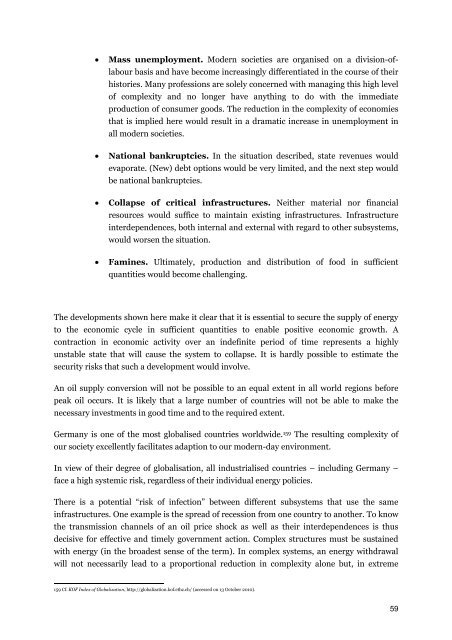PEAK OIL
PEAK OIL
PEAK OIL
Create successful ePaper yourself
Turn your PDF publications into a flip-book with our unique Google optimized e-Paper software.
Mass unemployment. Modern societies are organised on a division-oflabour<br />
basis and have become increasingly differentiated in the course of their<br />
histories. Many professions are solely concerned with managing this high level<br />
of complexity and no longer have anything to do with the immediate<br />
production of consumer goods. The reduction in the complexity of economies<br />
that is implied here would result in a dramatic increase in unemployment in<br />
all modern societies.<br />
National bankruptcies. In the situation described, state revenues would<br />
evaporate. (New) debt options would be very limited, and the next step would<br />
be national bankruptcies.<br />
Collapse of critical infrastructures. Neither material nor financial<br />
resources would suffice to maintain existing infrastructures. Infrastructure<br />
interdependences, both internal and external with regard to other subsystems,<br />
would worsen the situation.<br />
Famines. Ultimately, production and distribution of food in sufficient<br />
quantities would become challenging.<br />
The developments shown here make it clear that it is essential to secure the supply of energy<br />
to the economic cycle in sufficient quantities to enable positive economic growth. A<br />
contraction in economic activity over an indefinite period of time represents a highly<br />
unstable state that will cause the system to collapse. It is hardly possible to estimate the<br />
security risks that such a development would involve.<br />
An oil supply conversion will not be possible to an equal extent in all world regions before<br />
peak oil occurs. It is likely that a large number of countries will not be able to make the<br />
necessary investments in good time and to the required extent.<br />
Germany is one of the most globalised countries worldwide. 159 The resulting complexity of<br />
our society excellently facilitates adaption to our modern-day environment.<br />
In view of their degree of globalisation, all industrialised countries – including Germany –<br />
face a high systemic risk, regardless of their individual energy policies.<br />
There is a potential “risk of infection” between different subsystems that use the same<br />
infrastructures. One example is the spread of recession from one country to another. To know<br />
the transmission channels of an oil price shock as well as their interdependences is thus<br />
decisive for effective and timely government action. Complex structures must be sustained<br />
with energy (in the broadest sense of the term). In complex systems, an energy withdrawal<br />
will not necessarily lead to a proportional reduction in complexity alone but, in extreme<br />
159 Cf. KOF Index of Globalization, http://globalization.kof.ethz.ch/ (accessed on 13 October 2010).<br />
59


